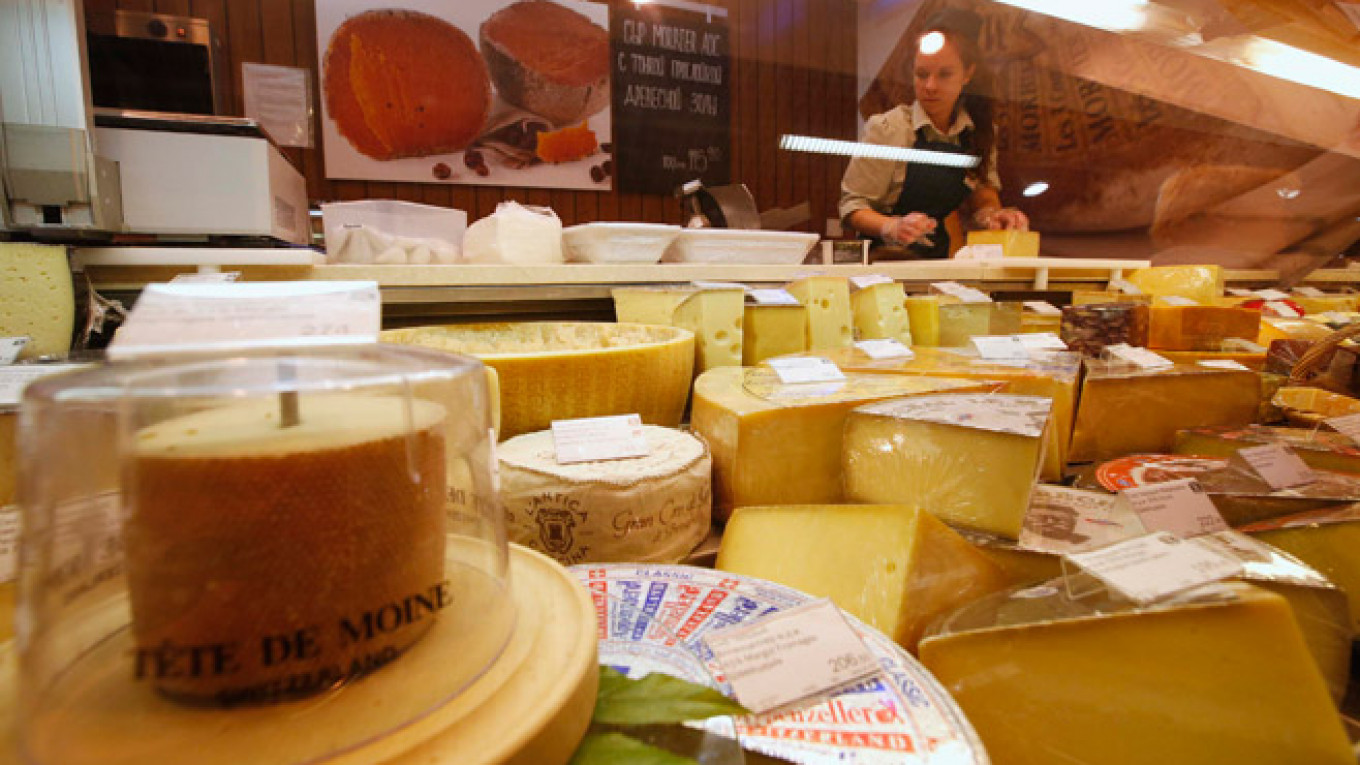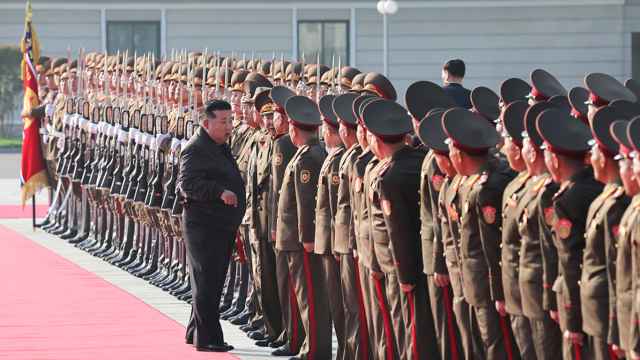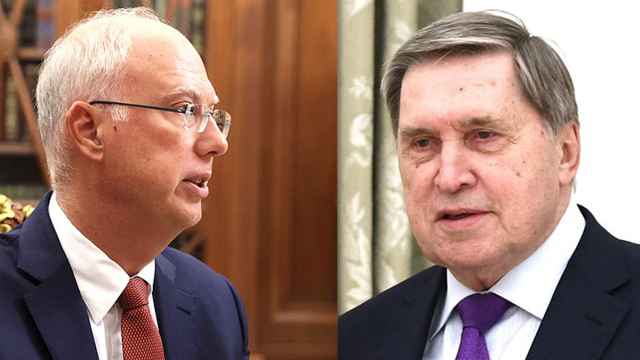Facing a ban on Italian parmesan cheese, chefs in Moscow have discovered a new source for fine Parmigiano-Reggiano: Belarus.
No sooner had Moscow banned dairy, meat, vegetables and fruit from most Western countries in response to sanctions over Ukraine, than Belarus, a former Soviet republic better known for black bread and potato pancakes, became a "producer" of top-quality cheese.
Once upon a time, the black marketeers of the former Soviet Union were known for using fake labels to pass off dodgy local products as expensive imports. Now it is the other way around.
Two chefs at Moscow restaurants described buying genuine Parmigiano-Reggiano, produced only in a few northern Italian provinces. It came in original Italian packaging, stuck with crude stickers saying "Made in Belarus."
Igor Bukharov, president of the federation of restaurateurs and hoteliers, said he was surprised to see a sign outside a restaurant which said simply "Parmesan" and gave a phone number.
The ban on most Western food imports has been hard to swallow for those who run the pizza joints, sushi bars and French-style brasseries that have opened up across Russia since the fall of the Soviet Union, especially in Moscow.
Chefs are searching for new suppliers, buying delicacies from smugglers, rewriting recipes and overhauling menus.
"The question for a chef is to take what he can, and as quickly as possible redo everything," said Bukharov, who is a co-owner of Nostalgie, an upscale restaurant serving gourmet versions of traditional Russian dishes.
Russian chefs used to similar privations in the past are likely to prove more resourceful than the foreigners cooking in many Moscow kitchens, Bukharov added.
"When you have never worked in a situation when there are bans on some products, when you've always been able to pick whatever you want, of course it is 'interesting'."
Shortages
Rostislav Ordovsky-Tanaevsky Blanco, who pioneered Western-style restaurants in post-Soviet Russia in the 1990s and whose Rosinter firm now runs Planet Sushi and Italian chain Il Patio, said his supply chain, Russia's biggest, was in tatters.
"The logistics have been completely destroyed," he said. "We'll need to wait at least three months to understand what the new reality is like."
Several chefs at high-end restaurants in Moscow, most of which source 85 to 90 percent of their produce from abroad, were convinced there is always a way to find what they need. Most spoke on condition of anonymity to avoid revealing their secrets for obtaining gourmet goods.
Belarus provides an obvious loophole. Minsk has imposed no ban on imports from the EU and has a Customs Union agreement with Moscow, which means products can be brought into Belarus legally and shipped to Russia with no border checks.
Two chefs said this was an increasingly common practice. Belarus has become a source not only of Italian cheese but of fruit and vegetables, all bearing phony Belarus labels.
An official at Russia's customs agency said it had no official figures on imports from Belarus and declined to comment on whether officials were seeing oddly packaged Parmesan cheese.
In Minsk, officials said that despite the Customs Union removing checks at the Russia-Belarus border, Moscow would still pick up on large imports of "Belarussian parmesan" by inspecting it at the final destination.
"At the level of gastronomic tourism, when cheese is brought in a suitcase, then maybe it can get through," said a Belarus government source. "But for large-scale, organized efforts, that will not be tolerated."
Leonid Pleshko, director of Belarus's state inspectorate for seeds, quarantine and plant protection, said food imports from the EU would be barred entry into Belarus if their documents showed they were intended for onward shipment to Russia.
Russian Regions
Smuggling products through routes like Belarus is only one answer. Restaurateurs are looking at new suppliers from Asia and South America, and also locally. That can mean being creative with menus.
One Moscow chef said lamb from Russia's southern Tatarstan region was of good quality but is sold only as whole animal carcasses, which meant his restaurant had to figure out what to do with cuts it normally didn't use.
Moscow has banned imports of various products in the past, usually at times of diplomatic tension. Last year it banned U.S. meat, and this year it banned meat from Australia. Russian restaurants found supplies from Argentina, Brazil and Uruguay.
Many chefs buy fish from North Africa. Russian officials have visited India to look at buffalo meat after shunning the country for years over quality concerns.
Argentina also produces brands of mozzarella, pasta and parmesan cheese, while Serbia and Russia's Kaluga and Bryansk regions can offer brands of mozzarella, chefs say.
Bukharov noted that Russian chefs have faced similar tests of their ingenuity in the past, particularly in 1998 when the collapse of the ruble caused import shortages, and again during the financial crisis of 2008.
"Of course it's bad for high-end restaurants. When there was the crisis in 1998 we bought cheaper products of a different quality and we found that those who ate at our restaurants felt the change immediately. We were forced to return to the better, more expensive products to keep our clients," he said.
Back then, he worked the phones for hours to try to find replacement products, and his menus were changed daily. Twenty kilograms of mutton he struggled to secure one day stretched to cover only 100 portions of a dish.
"We didn't close down. But it will be a challenge for those restaurants. They have to understand that in '98 we worked for a year without profit."
The Kremlin hopes the ban will spur Russian agriculture. Some foodies say it should be an opportunity to promote Russian cuisine, not just borshch and pickled herring but also less well-known dishes from the country's regions.
"Five years ago we began to talk about the necessity of boosting Russian regional cuisine," Bukharov said. "We must use all the technologies we got from the West on our own products, to market them so our that our gastronomical culture has its own face."
Still, even in areas where Russia produces quality food for export it may lack the infrastructure to reach domestic consumers across its 11 time zones. Russia's Far East fishing fleet catches sea food off the Pacific coast, but mainly exports it in Asia rather than shipping it across Siberia to European Russia. Meanwhile, Chinese tuna is appearing on Russian shelves.
For restaurants, the biggest problem may not be finding the ingredients but keeping costs down, particularly at a time when economic hardship hurts the spending power of customers.
One chef said getting Parmesan cheese from Belarus meant a 20 percent mark up. Others said prices had already risen between 5 and 20 percent in a month for some products.
Overall, food prices were 10.3 percent higher in August than a year ago, the Federal Statistics Service said, and while it recorded cheaper levels for fruit and vegetables, chefs say good quality tomatoes, previously sourced largely at the European market hub in the Netherlands, are becoming more expensive.
"Of course some people want to drive up prices at the moment," said Bukharov. "But I think in two, three months time it will all be sorted with new suppliers. I don't doubt it."
A Message from The Moscow Times:
Dear readers,
We are facing unprecedented challenges. Russia's Prosecutor General's Office has designated The Moscow Times as an "undesirable" organization, criminalizing our work and putting our staff at risk of prosecution. This follows our earlier unjust labeling as a "foreign agent."
These actions are direct attempts to silence independent journalism in Russia. The authorities claim our work "discredits the decisions of the Russian leadership." We see things differently: we strive to provide accurate, unbiased reporting on Russia.
We, the journalists of The Moscow Times, refuse to be silenced. But to continue our work, we need your help.
Your support, no matter how small, makes a world of difference. If you can, please support us monthly starting from just $2. It's quick to set up, and every contribution makes a significant impact.
By supporting The Moscow Times, you're defending open, independent journalism in the face of repression. Thank you for standing with us.
Remind me later.






